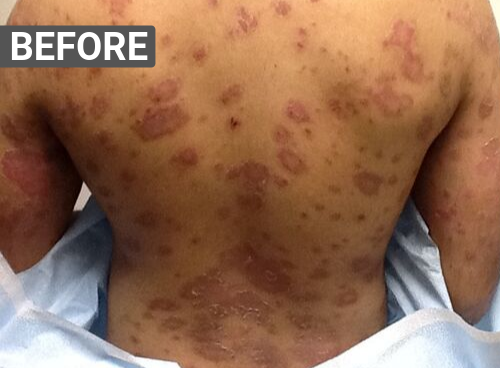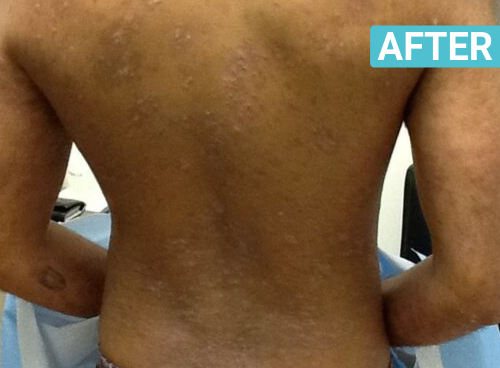5 Ways to Control Psoriasis Flare-Ups
5 Ways to Control Psoriasis Flare-Ups
Living with psoriasis has unique and emotional challenges. You may feel like it’s getting in the way of pursuing a social or romantic relationship, or your next career move. In this post we’ll breakdown 5 ways you can control psoriasis flare-ups.
But just because there are challenges doesn’t mean you can’t take control of your life and manage your lifestyle to help keep flare-ups at bay. Plus, health care providers and researchers are more focused than ever on finding solutions to help patients live more comfortably with psoriasis.


What Is Psoriasis?
Psoriasis is an autoimmune disease that affects more than 8 million people in the U.S. and 2–3% of people worldwide. It involves erroneous signals between immune cells and skin cells that cause the body to produce new skin cells too rapidly. As these cells accumulate on the surface of the skin, thick, scaly, bumpy red patches may form.
Psoriasis flare-ups can surface anywhere on the body, including the scalp, eyelids, elbows or knees. The condition is believed to be caused by a combination of genetics and external factors.
1. Decrease Stress
Stress is perhaps the greatest contributor to psoriasis flare-ups. Research indicates that stressful events can trigger flares in as many as 68% of adults with the condition.
When you’re under stress, your immune system doesn’t function normally. This can aggravate psoriasis, where an autoimmune malfunction already exists. Finding ways to keep your stress levels under control can play a significant role in keeping your psoriasis in check.
Ways to reduce stress include:
- Yoga, meditation, or mindfulness
- Seeing a therapist to talk through issues
- Tai Chi or Chi Gong
- Massage, acupuncture, or other physical or manual therapies
- Exercise or sports
- Spending time with uplifting and inspiring friends
What Patients Are Saying
“The professional, friendly staff has been great to work with. They are so accommodating to my schedule, and very flexible in fitting my treatment times into my busy schedule. It’s been a terrific partnership. I am so pleased with the results.”
“After years of suffering from psoriasis, constant trips to the dermatologist and many expensive creams, my psoriasis cleared, only to return with a vengeance later. Array’s cutting edge phototherapy treatment has made all the difference. It has provided relief that years of medication did not. I am so glad I made the call.”
2. Protect Your Skin
Skin injuries – such as overexposure to the sun, cuts, and even vaccinations – can trigger psoriasis. These kinds of skin traumas can lead to psoriasis plaques developing in areas where you don’t usually experience flare-ups. This aspect of psoriasis is called the Koebner phenomenon.
You can help protect your skin and avoid skin injuries by:
- Using sunscreen when outside for longer periods
- Take extra care to avoid cuts or scrapes (i.e., when shaving or cutting nails)
- Keep a close eye on your skin following vaccinations
- Never pick at plaques or lesions
- Avoid tattoos or piercings
- Wear gloves when gardening or working outside
3. Moisturize Your Skin and Scalp
 Keeping the skin and scalp moisturized is vital to prevent psoriasis from getting worse. Dry skin can trigger psoriasis flare-ups; it can also aggravate skin scaling and cause the skin to crack and bleed.
Keeping the skin and scalp moisturized is vital to prevent psoriasis from getting worse. Dry skin can trigger psoriasis flare-ups; it can also aggravate skin scaling and cause the skin to crack and bleed.
Moisturizers containing mineral oils, such as liquid paraffin and petrolatum, may be particularly useful for managing psoriasis. You can also use natural home remedies to moisturize your skin, including coconut oil and aloe vera gel, which contain antibacterial and anti-inflammatory properties. Tar shampoos and salicylic acid can help people manage scalp psoriasis.
4. Eat and Live Healthy
Eating healthy is essential for everyone, but it may be particularly important for preventing psoriasis flare-ups. A recent study indicated that 50% of subjects with psoriasis showed an improvement in their symptoms after reducing their alcohol, gluten, and nightshades intake (including potatoes, tomatoes and eggplants). Improvement was also seen in those who added omega-3s and fish oil, vegetables, and vitamin D supplements to their diet.
A 2018 review also found that dietary interventions can reduce the severity of psoriasis. Eating foods that reduce inflammation, such as salmon, may help improve psoriasis symptoms. Moreover, smoking and alcohol can aggravate psoriasis. Therefore, limiting your cigarette smoking and alcohol intake may prevent psoriasis from getting worse.
The particular foods that trigger flare-ups of psoriasis may vary from person to person. You can identify your food triggers by eliminating each food group in turn and observing whether or not your symptoms improve.
5. Phototherapy
Phototherapy, or light therapy, is one of the oldest and most effective drug-free treatments for psoriasis, as well as for other common skin conditions including vitiligo, alopecia areata, and eczema. The procedure involves a series of in-office treatments that are completed by exposing the skin to narrow-band UVB light.
According to a 2013 study in the American Journal of Clinical Dermatology, 60% to 75% of patients who received some type of light therapy achieved at least a 75% improvement in their condition.
Take Control of Your Condition
Psoriasis is a long-term autoimmune skin condition, the symptoms of which may come and go throughout your lifetime. There is no cure, but you can prevent and manage psoriasis flares using specific remedies, treatments and lifestyle methods.
Controlling your psoriasis – by getting the proper treatment, eating a healthy diet, and modifying your lifestyle to minimize psoriasis flare-ups – will help decrease the severity of your symptoms and improve your quality of life.

